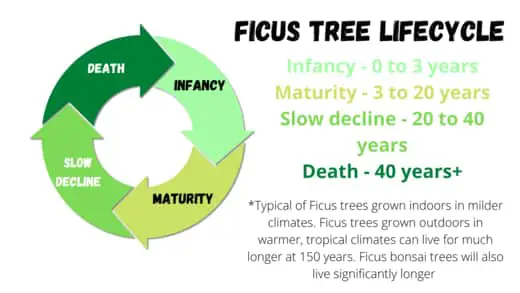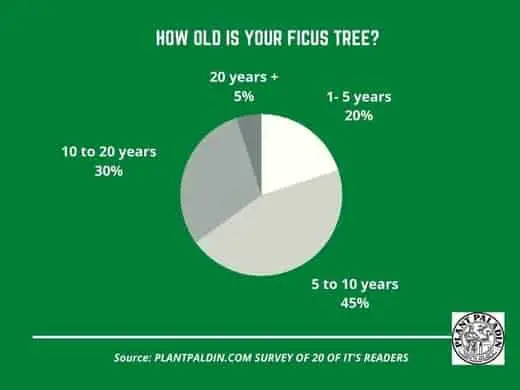This website is supported by its readers. If you click one of my links I may earn a commission. I am also a participant in the Amazon affiliates program and I will also earn a commission from qualified purchases.

With over 850 species worldwide, Ficus trees are easily one of the most popular tropical indoor trees available. Not only are Ficus excellent at removing harmful toxins from the air, but they also make for beginner-friendly bonsai trees. One question then a lot of you might have before you purchase your Ficus are how long do Ficus trees live?
The average lifespan for most species of Ficus is 25 years if kept indoors. Most Ficus trees will live between 20 and 40 years. Ficus trees such as Ginseng that are used in bonsai can live over 100 years due to the miniaturization process.
These then will live significantly longer than other indoor tree varieties.
Trees that are kept outdoors in warmer climates in their natural environments can live significantly longer between 100 to 200 years.
So how long do different Ficus species live? And what can you do to ensure your Ficus lives longer? Keep reading to find out more.
Just a quick heads up, over the past three years of running Plantpaladin, hundreds of people have asked for product recommendations. As such, You can find my favorite indoor bonsai tree here (link takes you to Bonsaiboy), my favorite outdoor bonsai tree (link takes you to Bonsaiboy), or have a look at all the products I recommend here.
How long do Ficus trees live?
To get to the bottom of how long Ficus trees live, I decided to grow my own Ficus, get in touch with my local botanical gardens, and even asked 20 Plant Paladin readers how old their Ficus trees are.
To summarize:
- Ficus trees typically live for between 20 and 40 years, with most Ficus trees grown indoors living around 25 to 30 years.
- These species tend to live for longer when kept in a pot as opposed to growing in the ground.
- Ficus trees that are used for bonsai trees, such as Ginseng Ficus will live for significantly longer due to the miniaturization process.
- Ginseng Ficus bonsai then can live up to 100 years with some Ficus bonsai being grown for well over 200 years.
- These trees will thrive and also live longer when kept in warmer, tropical climates with temperatures that are higher than 50 to 54 degrees Fahrenhighet (10 degrees celsius).
- Should you live in a temperate climate, you may be reducing your Ficus’ lifespan.
- Ficus trees are relatively fast-growing when not used for bonsai, they will take about 3 years to mature, then be productive for about 10 to 15 years before they start to deteriorate.
- Poor aftercare, such as lack or repotting, watering, fertilizer, or lack of sunlight will also significantly reduce your Ficus’ lifespan.
Ficus tree lifespan
The average lifespan of a Ficus tree regardless of species is between 20 to 40 years. The first 2 to 3 years will be spent maturing the tree. Your tree will then be productive for 10 to 15 years and the slow decline in health for the remainder of its life.
Hopefully, the table below will help explain its process:
Years | Lifespan |
1-3 | Infancy |
3-20 | Adulthood/maturity |
20-40 | Slow decline |
40+ | Steep decline |
How long do Ficus trees live – Years 1-3
During the first few years of your Ficus life, it will be maturing.
At this stage, your Ficus will grow faster than at any other point during its life.
How long do Ficus trees live – Years 3 – 20
At this stage of your Ficus life, your tree will be at its most productive. During this stage (if cared for correctly) your Ficus can add between 5 to 35 inches of growth per year).
This is when your Ficus tree will be at its strongest.
How long do Ficus trees live – Years 20 – 40
At this stage, your Ficus will still be productive and can be cared for, however, it will be a little less productive and efficient at things like nutrient absorption and photosynthesis. Think of this as a slow decline.
How long do Ficus trees live – Years 40+
It is rare for Ficus trees that have not been transformed into bonsai trees to live beyond 40 years.
That being said, it is not impossible, At over 40 years, Ficus will grow significantly less and take longer to recover from things like watering, pruning, and other general activities you will do with your tree.

What can make your Ficus tree live longer?
So a lot of you are likely reading this post as your Ficus tree is in the process of dying or getting on its life a bit.
If this is the case with you, fret not, there are still a few things you can do to keep your Ficus alive and have a longer lifespan.
These include the following
Maintain the right temperature
So Ficus trees are traditionally found in warmer tropical climates.
As such, they need warmer conditions to thrive.
If then you live in a more temperate climate such as the UK for example, when temperatures only rise above 10 to 15 degrees Celsius in the summer, then it’s super important to maintain a warm temperature for your tree to thrive.
Growing your Ficus then in a greenhouse or temperature-controlled space will be vital.
Word to the wise, however, during the winter, you want to avoid cranking up the heating in your house too high as this can cause your Ficus to dry out.
Ensure your tree gets enough sunlight
So next up, is ensuring your Ficus gets enough sunlight.
Similar to the point above, Ficus are tropical species and require a lot of direct sunlight to get enough food through photosynthesis.
If you keep your Ficus, in a dark room with no windows then this can significantly impact your tree’s lifespan.
Ensure then that your Ficus gets between 4 to 8 hours of sunlight per day.
Using artificial grow light can help improve this too.
Water regularly
Watering a Ficus can sometimes be a tricky challenge.
For example, if you have transferred your Ficus into a bonsai tree, then you want to ensure you only water when your tree is dry.
Alternatively, if you grow your Ficus regularly then watering that often can potentially cause overwatering in your tree.
Overeating or underwatering can both cause shriveling dry branches, yellowing leaves, and just impact your Ficus’ energy levels.
To prevent then, check your topsoil every other day and see if it needs watering.
A good rule of thumb to water your Ficus for a longer lifespan would be to water twice per week when the topsoil is dry to touch.
This may need to be increased during the warmer periods.
Remove pests and infections
Nothing will cause your Ficus tree to die early, and have a shorter lifespan than insect infestations and infections.
Bugs like Aphids, Scale, Spider Mites, and even Caterpillars love attacking Ficus and so it’s important to be prudent and check regularly for these types of bugs.
To remove them, you can use things like parasitic wasps, neem oil, pesticides, or blasting them with water.
Now fungal infections (usually displayed as white or yellow spots on the leaves of your tree) are another problem, often caused by overwatering or root rot.
If left unchecked this can kill your tree prematurely.
To prevent then take care carefully pruning your tree so all the leaves that have an infection on them are removed.
Now pets such as cats also like attacking Ficus so to read up on how to prevent this, check out my post here.
Repotting your Ficus regularly
Finally, the older your Ficus gets the larger it becomes.
One reason why your Ficus might have a shorter lifespan is its roots are getting crushed in the pot you keep it in.
To prevent then be sure to repot your Ficus regularly, say every 2 to 3 years once your tree is mature.
This will allow your tree to spread its roots and continue growing.
What can kill your Ficus tree prematurely?
Insect infestations, mold infections lack of sunlight, water, and repotting can all lead to your Ficus tree dying prematurely. Maintain correct care to increase your Ficus tree’s lifespan.
Do Ficus bonsai live longer theme regular trees?
Ficus bonsai trees will typically live a lot longer than regular Ficus trees that are kept indoors. The average lifespan of a Ficus bonsai can be 50 to 100 years when compared to the average lifespan of a Ficus which is between 20 and 40 years.
So why do Ficus bonsai live longer than regular Ficus?
Well if you think about it, all trees have energy stores inside their trunks that push out new leaves, grow the roots of your tree, and help will all its primary functions.
As bonsai trees are designed to be miniature trees, they do not have to support a larger tree structure.
As such, the energy it would have used to grow into a large indoor Ficus can then be spent on increasing the tree’s overall lifespan.
Just be aware that you still have to maintain the health of your Ficus tree through correct aftercare.
Typically then Ficus bonsai will live for 50 to 100 years, with some Ficus bonsai outliving their indoor counterparts by hundreds of years.
Do all Ficus sub-species live the same length?
Most Ficus trees will live for between 20 and 40 years. Some subspecies of Ficus however will have much longer lifespans. For example. Ficus Elastica and ginseng Ficus have been known to live on some occasions for hundreds of years.
How long does Ginseng Ficus live?
Ginseng Ficus will typically live for 40 years if kept indoors and 100 years if kept as a bonsai tree. It is not uncommon for Ficus trees that have been transferred into bonsai to live for hundreds of years, with some of the oldest Ginseng Ficus living for over 1000 years.
How long does Ficus Elastica live?
Another popular species of Ficus, commonly found indoors is Ficus Elastica, also known as the rubber tree.
Ficus Elastica can live for hundreds of years in the wild and 50 years in indoor conditions. The rubber from the tree can be harvested after the first 7 years of the growth of the tree.
How long does Ficus Retusa live?
Ficus Retusa will typically live for 50 years if kept indoors and 100 years if kept as a bonsai tree. It is not uncommon for Ficus Retusa trees that have been transferred into bonsai to live for hundreds of years, with some of the oldest Ficus Retusa living for over 1000 years.
How long do Ficus trees live indoors?
Ficus trees that are kept indoors will typically live for 20 to 40 years. This is significantly longer than keeping Ficus trees outdoors in colder more temperate climates.
How long do Ficus trees live outdoors?
Ficus trees that are kept outdoors in warmer, tropical climates can live for 50 to 60 years. Ficus trees that are kept outdoors in colder climates will typically thrive and can die in as little as three to five years.
How long do Ficus trees live in cold climates?
Ficus trees need warmer temperatures to grow, and so do not thrive in colder climates if planted outdoors. As such, Ficus trees will either not sprout in cooler climates or die after a few short years if kept in lower temperatures.
How long do Ficus trees live in warm climates?
Ficus trees in warmer, tropical climates can thrive and live for hundreds of years, typically between 150 to 200 years.
Do Ficus trees with figs live longer than Ficus without figs?
There is no difference in the lifespan of a Ficus tree that produces figs/fruit when compared with Ficus trees that do not produce figs/fruit.
The general thought process is that, because Ficus trees that produce figs use more energy in doing so, this would impact their life expectancy.
This is not the case with some fig trees in the wild (grown in warm conditions mind you) living for over 200 years.
The Roscoff Fig over in France continues to produce figs regularly at over 200 years old before it was cut down.
How fast do Ficus trees grow?
Ficus trees will typically add 12 to 36 inches of growth per year if kept in the right conditions. Ficus trees that have been transformed into bonsai trees such as Ginseng Ficus, grow at a much slower rate, averaging between 3 to 5 inches of growth per year.
Signs your Ficus is dying
The main signs that your Ficus ree may be nearing the end of its lifespan and is slowly dying are as follows:
Yellowing shriveled leaves
Yellowing, shriveled leaves are most often a sign that your Ficus tree has been overwatered.
This can significantly impact your tree’s ability to grow and if left unchecked will kill your tree
Dry, brittle branches
Dry branches, where the bark falls off easily or unhealthy branches that your tree has received all of a sudden are usually a sign of underwatering.
That being said, if your tree is older and you start noticing that more and more of its branches are starting to shrivel up get twisted and just look more gnarly, then remove these trees with some shears.
This will hopefully help promote new growth
No new figs
Now the vast majority of your will have Ficus trees that do not produce figs/berries and will not be able to grow them even if you plant their seeds.
This is because Ficus trees need fig wasps to pollinate them.
If you keep your Ficus tree outside and have your tree pollinated by Fig wasps in the past that produces fruit, notice that your tree is no longer producing fruit, then this is a surefire tree that your tree is starting to wind down as it gets older.
More insect infestations
Ficus trees are usually pretty good at avoiding insect infestations and usually have a natural defense to prevent them from getting infected.
It’s one of the reasons that makes them very good for beginners to grow.
That being said, if you notice that over time, your tree is getting infected more and more, then this too is a sign that your tree is dying.
How to care for a Ficus Tree?
Now whilst I cover how to care for a Ficus tree in my post on the topic, hopefully, the table below will help give you some quick pointers:
Ginseng Ficus Bonsai tree Requirements | Explained |
Water | Once per day in the spring-summer or if kept indoors. Once per week if kept outdoors during the winter. Only water if dry to touch. |
Sunlight | 4 hours of direct sunlight in the summer. LED grow light can also be used. |
Temperature | Between 60 degrees F and 100 degrees F |
Fertilizer | Fertilize 18 times per year, twice per month between spring and summer. Once per month in the fall and winter |
Repotting | Once every 2 to 3 years in the first 10 years. You can then report once every 5 years |
Placement | Can be placed outdoors in direct sunlight or indoors in a bright spot. |
Wire type | Both copper and aluminum wire can be used. |
Time to grow from scratch into maturity | 8 to 12 years to reach full maturity |
Potting soil | An inorganic Akdama, volcanic ash soil mix works best. |
Growth type | Slow growing, averaging 3-5 inches per year |
Size | Average store-bought trees are size is one or two-handed bonsai trees - 3 to 10 inches in size, 2 to 8 inches wide |
Lifespan | 50 to 150 years |
Fruit | figs |
Study on how long Ficus trees live?
Finally, undertook a quick survey of 20 plant paladin readers and asked them how long their Ficus trees were – here were the results:

My top picks for the gear you will need!
So like I mentioned earlier, over the past three years of running PlantPaladin, hundreds of people have asked me for my recommendations on the best bonsai gear on the market.
Having spent thousands of dollars on bonsai items these past few years and tested at least 100 bonsai-specific products, I’ve listed my favorite products below – All of which I highly recommend and think you can get great value.
They can purchase directly by clicking the link to take them to Amazon.
Bonsai Tool Set: One of the significant challenges I’ve had is finding a toolset that was not only durable but didn’t break the bank. SOLIGT has recently developed a fantastic bonsai tool set that covers all the tools you need to trim, prune, and repot your trees. – You can grab it here.
Complete Bonsai Set: Many of you will want to grow your bonsai trees entirely from scratch, but finding the varicose seeds, pots, and other items in one place can be challenging. Leaves and Sole then have created a complete bonsai set that I’ve personally used that ticks all the boxes. You can grab it here.
Bonsai wire: The number of times I’ve run out of wire for my bonsai or purchased cheap bonsai wire that doesn’t do the job is embarrassing for me to admit. After a lot of trial and error, I found that using Hotop’s aluminum bonsai wire is one of the best options on the market. This can easily be used for both indoor and outdoor bonsai. You can grab it here.
This post was written by Fehed Nicass who has been passionate about bonsai for over 3 years. He currently resides in the UK and works in sales.

